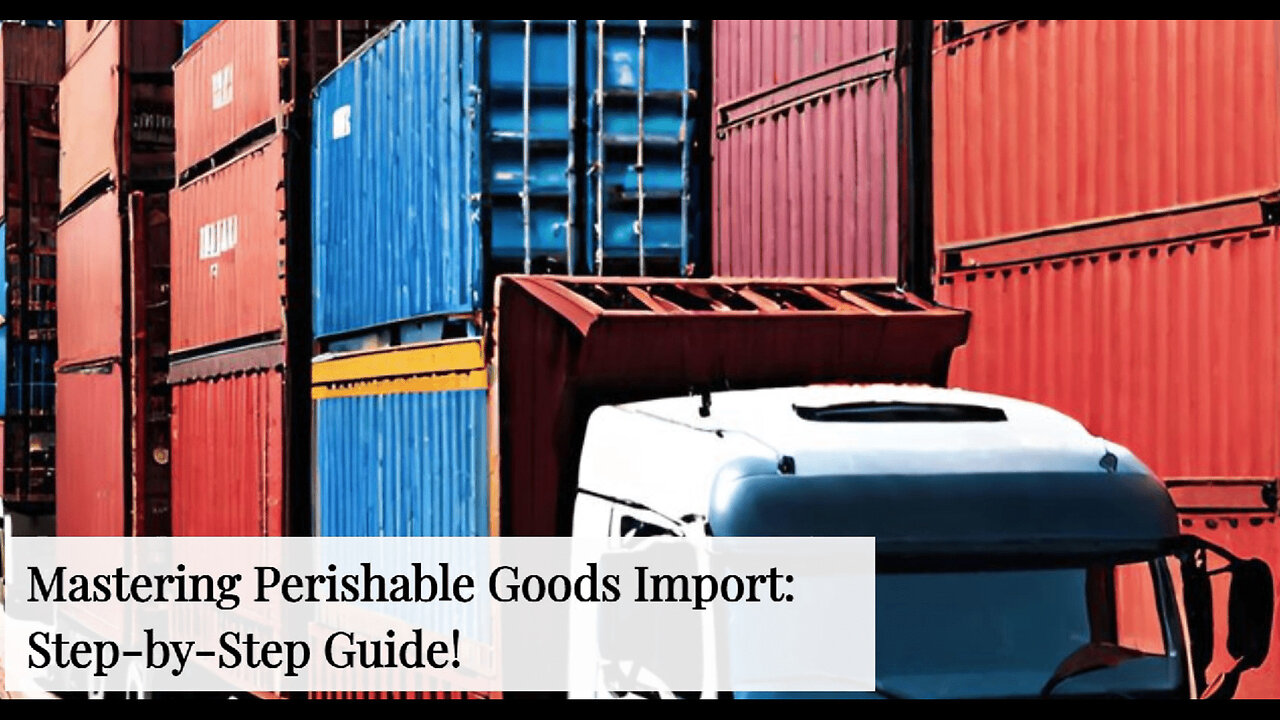Premium Only Content

Mastering the Art of Importing Perishable Goods: Your Comprehensive Guide
ISF Solution | (832-904-9333)
[email protected] | www.isfsolution.com
Importing perishable goods requires careful planning and adherence to specific procedures to ensure that the products arrive in optimal condition. The first step in the process is to hire a customs broker who is knowledgeable about customs regulations, tariffs, and documentation requirements. They can assist with completing accurate paperwork and determining the correct customs bond. The next step is to file an Importer Security Filing (ISF) at least 24 hours before the goods are loaded onto the vessel. This filing provides specific information to the US Customs and Border Protection (CBP) to assess the security risk of the cargo. Failure to file the ISF correctly or on time can result in penalties and delays.
Once the ISF is filed, coordination with transportation providers is essential. It is crucial to ensure that the transportation equipment used, such as temperature-controlled containers, is appropriate to maintain the freshness of the goods. Working with experienced shipping companies specializing in handling perishable items can minimize the risk of spoilage or damage during transit.
Upon arrival at the port of entry, customs clearance is required. The hired customs broker will handle the necessary paperwork and work closely with customs officials to ensure compliance with regulations. All required documentation, including the commercial invoice, packing list, and permits or licenses, must be readily available.
During the customs clearance process, inspections may be conducted on the perishable goods. These inspections can include checking for proper labeling, verifying documentation accuracy, and sometimes physical inspections of the goods themselves. Perishable goods, especially of animal or plant origin, may be subject to additional inspections.
Once customs clearance is obtained, a well-coordinated delivery plan should be in place to ensure the products remain fresh and reach their final destination timely. Specialized transportation services offering temperature-controlled delivery and storage options may be necessary. Efficient delivery is crucial due to the perishable nature of the goods.
In summary, importing perishable goods involves hiring a customs broker, filing an ISF, coordinating with transportation providers, ensuring proper temperature control, going through customs clearance, managing inspections, and arranging for timely delivery. By following these steps and working with experienced professionals, the importation process can be navigated with confidence while ensuring the quality of perishable goods.
#usimportbond #isfcustomsbroker #uscustomsclearing #isfentry
Video Disclaimer Here: For educational purposes - No affiliation with US government sectors.
0:57 - Importer Security Filing
-
 4:27:17
4:27:17
LadyDesireeMusic
4 hours ago $0.50 earnedDaily White Pill- Music & Chat
1.19K -
 1:33:25
1:33:25
Jeff Ahern
3 hours ago $2.71 earnedThe Saturday Show with Jeff Ahern
6.51K6 -
 LIVE
LIVE
Spartan
1 hour agoHalo 3 MCC Throwback Charity Tournament for Men's Mental Health | Kuhlect Mental Riqhts Spartan
34 watching -
 LIVE
LIVE
GrimmHollywood
3 hours ago🔴LIVE • GRIMM HOLLYWOOD • SGT WILKY'S WARZONE PALOOZA 2 •
80 watching -
 20:36
20:36
It’s the Final Round
2 hours ago $4.48 earnedNBA Best Bets & Player Props | Full Analysis & Predictions, FREE Today (Saturday 11/9) November 9th
11.5K1 -
 LIVE
LIVE
The Real Tombliboos - Live Streaming
14 hours ago $0.71 earned🎮 Charity Stream for Extra Life 4 Kids! ❤ Supporting Texas Children’s Hospital ! 🙌
160 watching -
 LIVE
LIVE
Amarok_X
4 hours ago🟢LIVE | BF6 REDSEC | OPERATION 100 FOLLOWERS | VETERAN GAMER
21 watching -
 18:08
18:08
Professor Nez
4 hours ago⚠ Charlie Kirk WARNED America about Zohran Mamdani
12.1K52 -
 LIVE
LIVE
GritsGG
2 hours ago#1 Most Warzone Wins 3943+!
26 watching -
 LIVE
LIVE
FusedAegisTV
6 hours agoFUSEDAEGIS | Generational Video Game?? | Expedition 33 PART I
31 watching